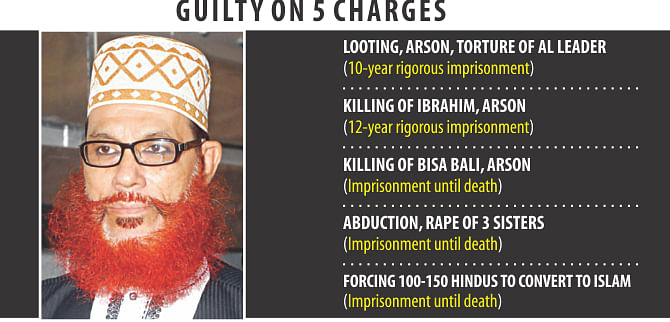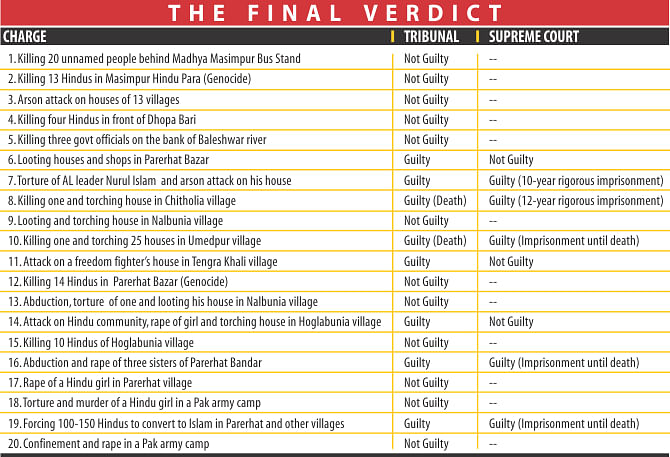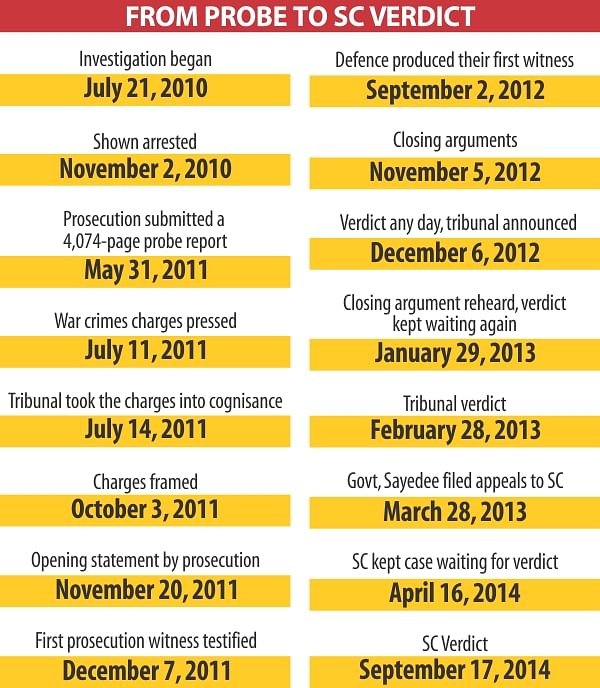JAILED until DEATH

Spared the gallows, Jamaat-e-Islami leader Delawar Hossain Sayedee will now be in prison until his death for crimes against humanity during the Liberation War in 1971.
The Supreme Court yesterday commuted his death sentence handed down by International Crimes Tribunal-1 on February 28 last year on charges of killing, abduction, torture, rape and forced religious conversion.
A five-member bench of the apex court, headed by Chief Justice Md Muzammel Hossain, delivered the verdict based on majority views. In a packed courtroom, the chief justice pronounced the verdict in five minutes.
Of the judges, three gave Sayedee imprisonment until death, one acquitted him of all charges and the other upheld the capital punishment, according to reliable sources at the SC.
 The grounds and reasons on which the verdict is based will be known once the full text is released.
The grounds and reasons on which the verdict is based will be known once the full text is released.
This is the second SC verdict on appeals in war crimes cases, which comes exactly a year after the apex court handed down death penalty to another war crimes convict Abdul Quader Mollah.
The verdict frustrated family members of the victims, justice seekers and war crimes trial campaigners.
Sayedee's family, counsels and his party were also dissatisfied and would seek a review of the judgment.
The judgment came more than 18 months after the ICT-1 sentenced the Jamaat nayeb-e-ameer to death for his involvement in the killing of Ibrahim Kutti and Bisa Bali in Pirojpur in 1971.
Seventy-four-year-old Sayedee, who earned the nickname “Delu Razakar”, had been found guilty on six more charges but the tribunal didn't award him sentences separately.
The apex court sentenced him to 12 years' rigorous imprisonment for killing Ibrahim Kutti and imprisonment until death for murdering Bisa Bali in Pirojpur. It also found Sayedee guilty on three more charges and acquitted him of three others.
There are confusions among legal experts over the scope for seeking review of the SC verdict. But Sayedee can seek presidential clemency if he wishes.
The law minister, war crimes trial campaigners and prosecution witnesses expressed dissatisfaction over the apex court's verdict.
Gonojagoron Mancha, a pro-Liberation War platform, rejected the verdict, saying it was "biased” and an “outcome of a compromise” between the government and Jamaat.
"We are extremely frustrated. We hoped the tribunal verdict would be upheld … but things changed," said Mahabubul Alam Howlader, a prosecution witness from Pirojpur.
The Awami League-led 14-party alliance accepted the verdict, while the BNP refrained from making any statement as it did on previous occasions.
"As a citizen of the country and a member of the cabinet, I am respectful to the judgments by any court in Bangladesh. But as the son of a freedom fighter, I am shocked, disappointed and hurt by this judgment,” Law Minister Anisul Huq told The Daily Star.

Asked whether the government would file a review petition with the SC, the minister said they would wait for the full text of the verdict on review petitions of Quader Mollah to set the next course of action.
“We will know from the full text of the judgment whether the Supreme Court rejected Quader Mollah's review petitions on merit or not, and whether review petitions are maintainable,” he said.
Quader Mollah, another Jamaat leader, was executed on December 12 last year following a verdict by the top court.
Jamaat-e-Islami, which directly opposed the birth of Bangladesh in 1971, called countrywide hartals for today and Sunday protesting the verdict. Jamaat-Shibir men clashed with police in several districts soon after the pronouncement of the verdict.
Ahead of the apex court's verdict, security measures were heightened on the court premises, different parts of the capital and elsewhere across the country.
Following the tribunal's verdict of death sentence on Sayedee last year, activists of Jamaat and its student body Islami Chhatra Shibir resorted to violence across the country, leaving 65 people dead and several hundred injured in just a week.
Chief Justice Md Muzammel Hossain and the other four judges took seats at 10:05am yesterday in the presence of several hundred lawyers and journalists.
The other four judges are -- Justice Surendra Kumar Sinha, Justice Md Abdul Wahhab Miah, Justice Hasan Foez Siddique and Justice AHM Shamsuddin Choudhury Manik.
"Criminal appeal number 39 of 2013 [the appeal filed by Sayedee] is allowed in part by majority. Criminal appeal number 40 of 2013 [the appeal filed by the government] is allowed in part by majority,” said Justice Muzammel.
One month after the ICT-1 verdict on February 28 last year, Sayedee filed the appeal with the SC seeking acquittal from all eight charges against him.

On the other hand, the government lodged a separate appeal seeking punishment on all eight charges, including the six on which the ICT-1 found him guilty but didn't give any punishment.
"Allama Delawar Hossain Sayedee is sentenced to 10 years' rigorous imprisonment by majority in respect of charge number 7,” said the chief justice.
The charge involved the detention and torture of Awami League leader Nurul Islam, and looting and torching of his house in Pirojpur, the home district of Sayedee.
In respect of charge number 8, the court said Sayedee's sentence was altered to 12 years' rigorous imprisonment by majority. The charge was related to the abduction and torture of Ibrahim Kutti and Mofizuddin Posari in Chitholia of Pirojpur and the killing of Kutti.
The ICT-1 had awarded Sayedee death penalty for the war crimes.
On charge number 10, which was related to the killing of Bisa Bali and torching of 25 Hindu houses in Umedpur of Pirojpur, the chief justice said the sentence was “commuted to imprisonment to life, i.e. rest of his natural life by majority.”
The court also awarded Sayedee imprisonment until death for charge number 16 and 19. Charge number 16 was related to the abduction and rape of three sisters at Parerhat Bandar in Pirojpur while charge number 19 involved forced conversion of 100/150 Hindus to Muslim and forcing them to go to mosques.
The apex court, however, acquitted him of three other charges (number six, 11 and 14) which were related to looting, torture and rape during the Liberation War.
According to the ICT-1 verdict, Sayedee, son of Yousuf Ali of Southkhali village in Pirojpur, was a grocer in Parerhat Bandar in 1971. But he became rich overtime, and owned huge properties in the capital and Khulna. He made a fortune through illegal means during the Liberation War.
After independence, the countrymen saw how a Razakar turned into an Islamic orator and became a member of parliament of Bangladesh, whose birth he vehemently opposed.
The ICT-1 in its verdict said it was trying 30-year-old Delu, a Razakar who collaborated with the Pakistan occupation army in 1971, not Allama Delawar Hossain Sayedee, a top Jamaat leader and two-time lawmaker.
Immediately after yesterday's verdict, Attorney General Mahbubey Alam said he was not happy with the judgment but it at least unmasked Sayedee.
"Though Delawar Hossain Sayedee presented himself as a very religious and innocent person, it has been proved now that Sayedee had tortured people, and forced people to convert [to Islam]. He was involved in raping women during the Liberation War,” he said.
Sayedee's son Masood Sayedee told The Daily Star that he and his family members believed his father was "innocent" and that they were deprived of justice.
Sayedee, who was detained on June 29, 2010 in a case for allegedly hurting religious sentiment, was shown arrested in the war crimes case on November 2 the same year.
He was indicted on 20 charges in October 2011, and the ICT-1 delivered its verdict on February 28 last year after lengthy case proceedings.
The tribunal found him guilty on eight charges and acquitted him of 12 other charges.
Sayedee is now in a condemned cell at Kashimpur Jail-1 in Gazipur. He is supposed to be shifted to a prison cell from there following the SC verdict.
Jailer Amzad Hossain told The Daily Star that they didn't inform Sayedee about the SC verdict, as they were yet to get the official documents in this regard.
"Once we receive a copy of the Supreme Court verdict, he will be shifted to a prison cell.”

 For all latest news, follow The Daily Star's Google News channel.
For all latest news, follow The Daily Star's Google News channel. 



Comments